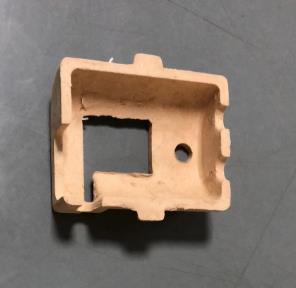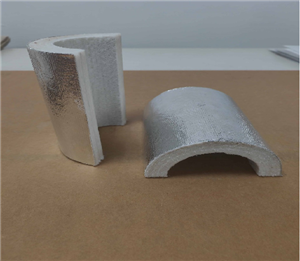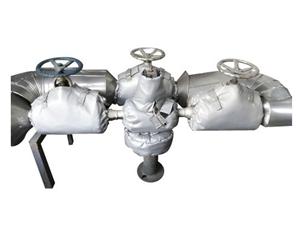Fiberglass cotton, much more than you think!
Glass fiber cotton is glass and quartz sand as the main raw material, mixture mixed with various additives according to certain proportion, melting into glass solution in the melt kiln, glass solution via the forehearth platinum plate form stable flow leakage, arrive again through the spinning machine side has holes in the high speed rotating centrifugal machine, under the action of centrifugal force, the solution was dumped into a glass fiber.Then, under the effect of high-speed jet of mixed gas, a fiber is pulled into glass fiber, glass fiber landing to set cotton mesh belt at the same time, the water spray adhesive and abhorred, then through compaction, curing, transverse, longitudinal cutting forms certain specifications of the products, and can according to customer requirements, on the production line of composite moistureproof layer, finally compressed package assembling, packing, warehousing.
Fiberglass cotton · thermal insulation
Glass cotton slag ball content is low, uniform thin and thin fiber cross distribution, greatly reduce the thermal conductivity of the product, with excellent thermal insulation performance.
The content of slag ball in centrifugal glass wool is less than 0.3%, the average diameter of glass fiber is less than 5 muon and 8 muon, and the corresponding thermal conductivity is also different.
Fiberglass cotton · sound absorption and noise reduction
There are a lot of tiny pores in the glass fiber cotton, which is a typical porous sound-absorbing material with good sound-absorbing characteristics.Sound waves can enter the material along the pores, causing the vibration of air molecules in the void. Due to the viscous resistance of air and the friction between air molecules and the pore wall, the sound energy is converted into heat energy and lost.
Air flow resistance is an important factor affecting the sound absorption performance of glass wool.The flow resistance is too small, which means the material is sparse, the air vibration is easy to pass through, and the sound absorption performance is decreased.The flow resistance is too large, which indicates that the material is dense, air vibration is difficult to be introduced, and the sound absorption performance is also decreased.
Glass fiber cotton · grade A fire prevention
In the current standard, building insulation fire prevention is divided into four grades:
Class A (non-flammable), class B1 (non-flammable), class B2 (flammable), and class B3 (flammable).Glass wool belongs to inorganic non-combustible materials, fire to reach A class.
Glass fiber cotton · stable at high temperature
The shrinkage temperature of thermal load refers to the temperature corresponding to 10% thickness shrinkage after heating under a certain load.At this temperature, the material size, mechanical properties and thermal properties do not exceed the allowable range of change, that is, to ensure the maximum temperature of normal use.
Due to different shapes and densities of glass wool, the shrinkage temperature of thermal load will be different.For example, when the diameter of glass wool board is 8 microns and the density is 24kg/ m3, the thermal load shrinkage temperature is ≥250℃.When the density of glass wool board is 64kg/ m3, the thermal load shrinkage temperature can reach ≥400℃.
The parameter value of glass wool coil felt, glass wool tape, glass wool blanket, glass wool tube shell and other products with different forms will also be different.
Fiberglass cotton · detest water treatment
Fiber insulation materials, such as glass cotton products, mineral wool products are basically do not hate water, but after the treatment of hate water, its hate water rate can reach more than 90% or even higher.At present modified silicone hydrophobic agent is more general hydrophobic agent, its hydrophobic principle is the use of organic silicon compounds and inorganic silicate materials between the strong chemical affinity, to effectively change the surface characteristics of silicate materials, hydrophobic rate can reach 98% and above.
Fiberglass cotton · specification selection
According to the national standard, the thickness of glass wool board is 25-100mm and the density is 24-120kg/ m3.The thickness of glass wool blanket span is the same as the thickness of glass wool board, the density will be smaller, there are several specifications such as 10-48 kg/m ^ 3.
The choice of thickness and density of fiberglass cotton mainly depends on the thermal resistance and sound absorption of the material.For example, cold area roof thermal resistance requirements 1.82, you can choose the thickness of 100mm, density of 12kg/m 3 insulation cotton, thermal resistance value can reach the standard.
In terms of sound absorption performance, the thickness of glass fiber cotton remains unchanged, the bulk density increases, and the sound absorption effect is enhanced.However, when the bulk density increases to a certain degree, the material becomes dense, the flow resistance is greater than the optimal flow resistance, and the sound absorption effect decreases instead.For example, for glass wool with a thickness of 50mm and bulk density of 16kg/ m3, the sound absorption coefficient of medium and high frequency (>500Hz) is close to 1. When the bulk density is close to 110kg/ m3, the sound absorption performance reaches the maximum; when the bulk density exceeds 120kg/ m3, the sound absorption performance decreases.
Glass fiber cotton · safe and environmentally friendly
Glass wool is an inorganic insulation material made of glass and quartz sand as the main raw materials.Traditional glass wool products using phenolic resin as the main binder, inevitably in the glass wool free formaldehyde, phenol and other harmful substances, but the content of formaldehyde in line with the current domestic standards, can be assured of use.
Glass wool · application scope
Fiberglass cotton for steel structure
Glass wool used in steel structure can be widely used in the insulation envelop system of industrial workshop, logistics storage, large supermarkets, exhibition centers, airports, sports venues and other large public buildings.
Glass fiber cotton for curtain wall
Curtain wall with detest glass wool board is widely used in large commercial buildings, office buildings, hotels, sports venues, airport terminals and other building curtain wall insulation parts.
3 hard glass fiber cotton
The composite hard glass wool adopts the vertical fiber glass wool board (directly laid insulation material) as the main insulation material, which is a composite insulation material formed by the composite fire plate with high hardness, anti-crack and anti-impact structure.Widely used in all kinds of flexible waterproof roof building system and old structure roof maintenance and other fields.
Glass fiber cotton for sound insulation
Sound insulation glass fiber cotton is widely used in indoor partition, central air conditioning, entertainment places (KTV, theater, etc.) and equipment (computer, air compressor, etc.) sound absorption processing and general building sound absorption noise reduction.
Fiberglass cotton for hvac
Glass wool felt is a kind of light, soft, high tensile strength, maneuverable economic material.Glass wool board has material to pledge firm, the surface is smooth, the characteristic with strong compression sex.After glass wool mat and glass wool board product compound corresponding stick face material, the insulation layer that can use style path outer wall is wrapped up material, or install in wind path inner wall to serve as silencer lining, can control heat to pass through wind path wall effectively transfer, reduce the cold heat loss in running process of air inside the pipe.At the same time, it can greatly eliminate the noise transmission of wind duct.
Glass fiber cotton for sandwich board
Sandwich board glass wool can be widely used in industrial workshop, warehouse, cold storage, box packaging, light steel residence, original building sandwich room, movable board room, various purification room, air conditioning room and so on.
High temperature glass fiber cotton
It can be widely used in electric power, petroleum, chemical, light industry, metallurgy and other industries as well as boiler, reaction kettle, tank, pipeline and other high temperature equipment insulation, heat insulation and noise reduction.Insulation structure of the outer protective layer according to the specific situation can choose tin, aluminum, stainless steel or plaster materials.




